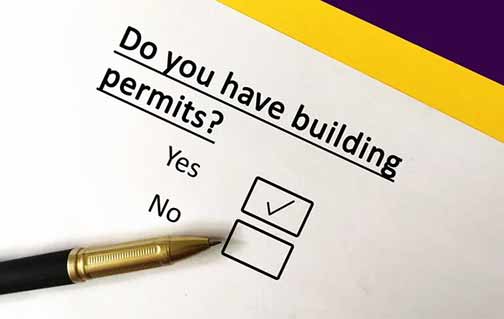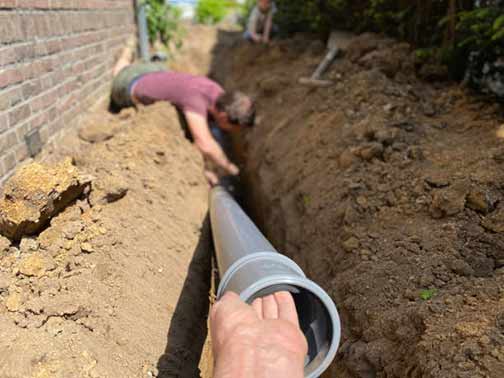
If you’re a homeowner in Chicago and in need of sewer line replacement, you may be wondering whether a permit is required. Here we aim to provide you with the necessary information regarding sewer line replacement permits in Chicago.
The Importance of Sewer Line Replacement Permits
Before we delve into the specifics of sewer line replacement permits in Chicago, let’s first understand why permits are required in the first place. Sewer line replacement involves significant excavation and repair work, which can have an impact on public safety, utility services, and neighboring properties. Permits are a way for local authorities to ensure that the work is carried out safely and in compliance with building codes and regulations.
By obtaining a permit, you demonstrate your commitment to following proper procedures and ensuring that the sewer line replacement is done correctly. It also helps protect you from potential liability and ensures that your property value is not affected due to unpermitted work.
Is a Permit Required for Sewer Line Replacement in Chicago?
Yes, in Chicago, a permit is required for sewer line replacement. The Chicago Department of Buildings, in collaboration with the Department of Water Management, oversees the permitting process for all construction activities in the city, including sewer line replacement.
Replacing a sewer line typically involves excavating the ground, removing the existing damaged pipe, and installing a new one. This type of work falls under the category of construction, which mandates the acquisition of a permit. Failing to obtain a permit before initiating sewer line replacement can result in penalties, fines, or even work stoppage.
The Permitting Process
The permitting process for sewer line replacement in Chicago can seem daunting, but by following the necessary steps, you can ensure a smooth and efficient experience.
Assessing the Need for Replacement
Before you can proceed with applying for a permit, it’s essential to determine whether your sewer line requires replacement. Signs of a damaged sewer line include recurring clogs, foul odors, sewage backups, slow drainage, or the presence of mold in your home.
If you suspect that your sewer line is damaged, it’s advisable to speak with a licensed Chicago plumber who can assess the situation and provide professional guidance on whether replacement is necessary.
Hiring a Licensed Contractor
Engaging a licensed and experienced contractor is crucial for a successful sewer line replacement project. A professional contractor will not only ensure that the work is done correctly but will also guide you through the permitting process.
Before hiring a contractor, be sure to verify their credentials, check for any complaints or legal issues, and request references from past clients. This will help ensure that you’re working with a reputable professional.
Gathering Required Documentation
When applying for a sewer line replacement permit, you’ll need to provide specific documentation. The required documents may vary based on the scope of the project and the location of your property, but generally, you can expect to provide the following:
- Property information, including ownership details
- A site plan showing the location of the proposed replacement
- Construction drawings and specifications, detailing the scope of work and materials to be used
- Proof of contractor’s license and insurance
- Other relevant permits, such as plumbing permits
It’s essential to ensure that all the required documentation is complete and accurate to avoid delays in the permitting process.
Applying for the Permit
Once you’ve gathered all the necessary documentation, you can begin the permit application process. In Chicago, permit applications can be submitted online through the Chicago Department of Buildings’ website or in person at the Permit Application Center.
During the application process, you’ll need to pay the required fees, which will vary depending on the nature and scope of the project. It’s important to note that the permit fee is non-refundable, even if your application is denied.
In almost all cases, the plumbers you choose will do all of this for you and any fees will be paid for upfront and will be added to your total bill.
Permit Review and Approval
After submitting your permit application, it will be reviewed by the Chicago Department of Buildings. The review process ensures that your proposed sewer line replacement complies with the relevant building codes, regulations, and zoning requirements.
The review timeframe can vary, but generally, it takes a few weeks for a decision to be made. It’s advisable to follow up with the department if you haven’t received any updates after the specified review period.
If your application is approved, you will receive the necessary permits to commence your sewer line replacement project. It’s crucial to display the permits at the work site as required by the department.

When it comes to sewer line replacement in Chicago, obtaining a permit is a necessary step. It helps ensure that the work is done safely, in compliance with regulations, and protects your property value.
The Consequences of Unpermitted Sewer Line Replacement
Engaging in sewer line replacement without the required permits can have severe consequences. Chicago’s Department of Buildings takes permit violations seriously and may impose various penalties, including:
- Fines: You may be subject to substantial fines for unpermitted work. The fines can increase if the violation continues.
- Work Stoppage: The department has the authority to issue a stop-work order, halting all construction activities until the necessary permits are obtained.
- Safety Concerns: Unpermitted work may not comply with safety requirements, posing risks to the public, workers, and neighboring properties. It’s important to prioritize safety by obtaining the required permits.
- Liability Issues: If any issues or damages arise from unpermitted work, you may be held liable for any resulting injuries, property damage, or loss.
To avoid such complications, it’s always recommended to adhere to Chicago’s permitting requirements for sewer line replacement.
To Sum it Up
When it comes to sewer line replacement in Chicago, obtaining a permit is a necessary step. It helps ensure that the work is done safely, in compliance with regulations, and protects your property value. By following the appropriate process, hiring a licensed plumber, and providing the required documentation, you can avoid potential penalties and enjoy a successful sewer line replacement project.
—